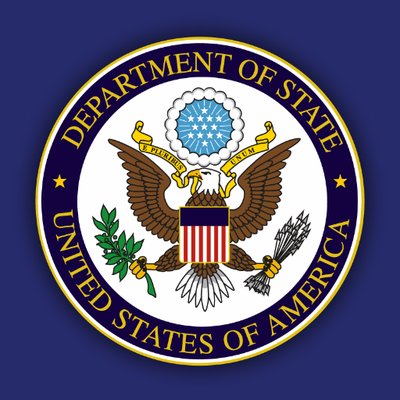MODERATOR: (Inaudible.) We welcome you to (inaudible) press conference, (inaudible).
STATE COUNCILOR WANG: (In Chinese.)
MODERATOR: (In Chinese.)
SECRETARY POMPEO: Good evening. I’m delighted to be with you, Councilor Wang. I mean, it’s the second time we’ve had the chance to meet, first in Washington and now here, and it’s great to make my first trip to China as the United States Secretary of State. I want to thank all of our Chinese hosts for their incredible hospitality.
I also want to thank China and President Xi for his role in helping bring North Korea to the negotiating table and for the continued support as we work to achieve the complete, verifiable, and irreversible denuclearization of North Korea.
This is my third country that I’ve had the chance to speak with today. Each has reinforced three important things that happened in Singapore: First, the commitment to a fundamentally changed relationship. Japan, the Republic of Korea, and now China have all acknowledged that we have turned a corner, that we have begun a process away from the threat of war and towards peace on the peninsula. Each of those three countries too has acknowledged the importance of the work that President Trump has undertaken and the commitment that Chairman Kim has made towards that very end, to achieve that denuclearization.
And each of those three countries has also acknowledged that it is important that the sanctions regime that is in place today remain in place until such time as that denuclearization is in fact complete. There has been unanimity in that set of objectives and I’m heartened by that following the Singapore summit.
The United States wants a very constructive relationship with China. That means we have to make concrete progress on our top priorities. We’ve seen the power that comes when the United States and China do work together, when we don’t treat the relationship as being zero-sum. We’re stopping the flow of illegal opioids together, and this will save countless American lives and we are deeply appreciative of China’s support.
We discussed trade today. Our deficit with China is still too high. I stressed how important it is for President Trump to rectify that situation so that trade becomes more balanced, more reciprocal and more fair, with the opportunity to have American workers be treated fairly. We had good and constructive discussions.
We also need to make some progress between our two countries on security. As Councilor Wang mentioned, I reaffirmed our concern with respect to China’s efforts to build a militarized outpost in the South China Sea, endangering the free flow of trade and threatening the sovereignty of other nations and undermining regional stability. I urged Councilor Wang and he confirmed China’s willingness to resolve these disputes in a peaceful way without resort to threats, coercion, or intimidation. I am confident that we can continue to work together towards that end.
When our two countries disagree, our two countries will speak up and firmly stand for each of our people. Our values, including the respect for human rights and religious freedom and the rule of law, are important. When we cooperate, the United States and China can make great progress. There is much work ahead for our two countries. I am committed to working with you and with China to achieve those objectives. Thank you.
MODERATOR: (In Chinese.)
QUESTION: (In Chinese.)
STATE COUNCILOR WANG: (In Chinese.)
MODERATOR: (In Chinese.)
MS NAUERT: Next question goes to Michael Gordon from The Wall Street Journal. Keep it to one question, if you would, please. Thank you.
QUESTION: Okay. A question for State Councilor Wang: The United States has taken the position that North Korea should take major steps to dismantle its nuclear weapons and forces in a short period of time, in two and a half years. It also says, as you’ve just heard, that there should be no sanctions relief until these steps by North Korea have been taken. Will China support this approach? Will China press North Korea to take disarmament steps in the next two years? And will it pledge to withhold any sanctions relief until these steps by North Korea are carried out?
STATE COUNCILOR WANG: (In Chinese.)
SECRETARY POMPEO: May I add to that? State Councilor Wang and I had a good, constructive discussion on these very topics. With respect to the pace at which the denuclearization will take place, I think we both agreed that we need to do it in as timely a fashion as is possible to achieve the outcome, and that the security assurances that we’ve talked about are provided at times that are appropriate.
We also talked at some length about the sanctions. China has reaffirmed its commitment to honoring the UN Security Council resolutions. Those have mechanisms for relief contained in them, and we agreed that at the appropriate time that those would be considered. But we have made very clear that the sanctions and the economic relief that North Korea will receive will only happen after the full denuclearization, the complete denuclearization, of North Korea.
MODERATOR: (In Chinese.)
QUESTION: (In Chinese.)
SECRETARY POMPEO: So there are many ways that we’ll achieve that. Among the most important of them is we continue a sound strategic dialogue between our two nations, so that where there are places where we disagree we iron out those differences and that we express our interests very clearly and work towards the peaceful resolution of those conflicts.
Make very clear: There are many things today where China and the United States work very closely together that improve the lives for the citizens of each of our two countries. I mentioned a couple of them in my opening remarks. We’ll continue to work alongside of those – on each of those. There are many, many places where our two nations are far better off working together in concert and aligned as opposed to working at interests that diverge, and I am committed to working with Councilor Wang to achieve those in every venue where our two nations operate.
MS NAUERT: Our final question goes to Rich Edson from Fox News.
QUESTION: Thank you very much. Mr. Secretary, how confident is the United States that it knows the extent of the North Korean nuclear program, and how confident are you in North Korea’s willingness to divulge that information?
And to both of you, Mr. Foreign Minister and Mr. Secretary, did you discuss the suspected attacks on American diplomats here and have you learned any new information regarding what could be causing that?
SECRETARY POMPEO: So let me answer each of those two questions. I’ll take your second question first. The issue with respect to the American Foreign Service officer who suffered a health incident here was raised. I asked the Chinese to continue to cooperate with us to try and figure out how that happened, how it came to be, and to work with us to conduct an investigation sufficient that we can prevent it from happening again. I raised the issue, and Councilor Wang was kind in saying that he has provided and will continue to provide full support to ensuring that Americans serving here as diplomats will continue to be safe and secure, and I thank him very much for that.
With respect to the scope and scale of the North Korean nuclear program, I don’t want to get into the details of our intelligence precisely, but we have a reasonable understanding. It is incredibly important that we get a full understanding of that as quickly as possible. And as part of the efforts that will be undertaken in the week and weeks ahead, we will work with the North Koreans to come to have a fuller understanding of that so that we can begin to execute together the commitments that President Trump and Chairman Kim made. They made real commitments to denuclearize, each of them, and President Trump made a commitment that he would provide security assurances that were commensurate with that. Those are firm commitments that the two leaders made and an understanding that the program is a piece of what will ultimately lead to our capacity to verify the full and complete denuclearization has actually taken place.
STATE COUNCILOR WANG: (In Chinese.)
MODERATOR: (In Chinese.)



